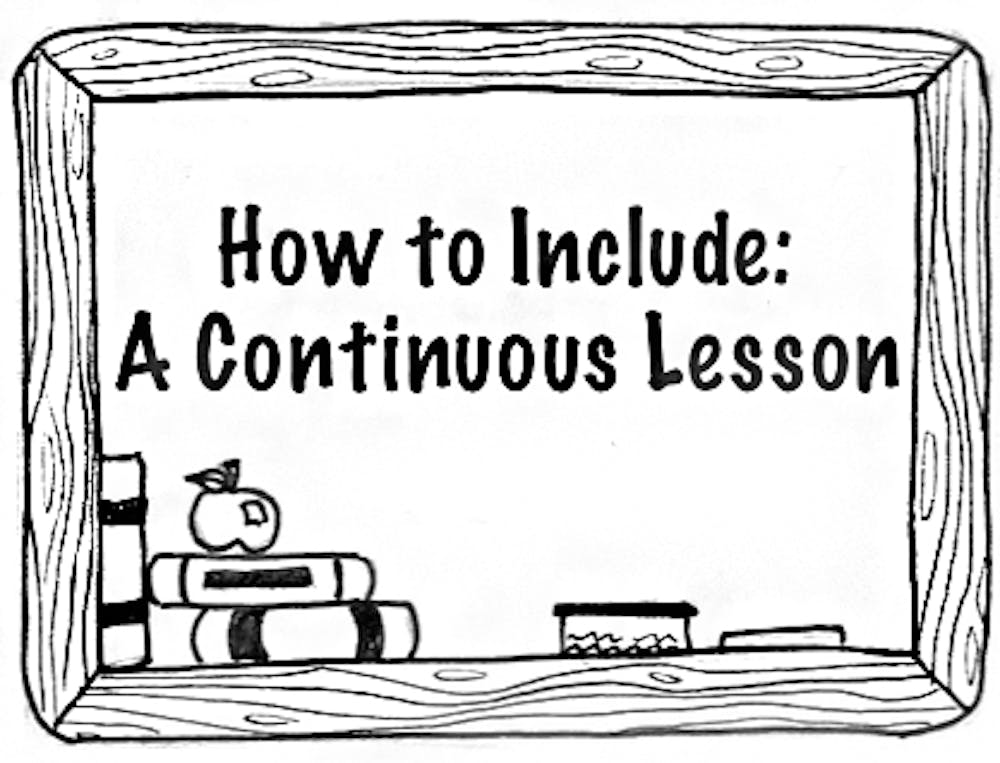The word “inclusivity” gets thrown around a lot. At Middlebury, we commit time and time again to building an inclusive campus, to creating inclusive communities that stage inclusive conversations. Still, people rarely seem sure what inclusivity actually looks like — it’s much easier to say what it doesn’t look like, or to identify spaces in which doesn’t exist.
And so we as a board are impressed with the college’s new Inclusive Practitioners Program, which aims to implement tangible inclusivity measures in Middlebury classrooms and around campus more generally. The program, designed by Director of Education for Equity and Inclusion Renee Wells, is comprised of 14 different workshops related to inclusivity and anti-bias, from dealing with difficult student comments to properly using students’ preferred gender pronouns.
Although these classes are optional, we ask that faculty attend.
We’ve seen firsthand why this kind of training is so important. Members of the editorial board remember friends dropping courses after being excluded from class spaces. Others remember professors failing to make accommodations for religious observances, or offering inadequate support to students navigating disabilities. In some cases, these professors’ un-inclusive reputations preceded them — students were warned by their peers not to register for certain courses in the first place. Issues of inclusivity can impede not only a student’s ability to learn, but also a professor’s ability to teach.
While these are losses, we believe they’re avoidable ones. We’ve also had shining examples of what inclusive learning environments do look like — and these glimpses leave us excited about the IPP’s broader vision. We’ve been in lecture halls when professors have publicly apologized for comments that left class members feeling marginalized, and took the time and effort to adjust their discourse moving forward. We’ve received new syllabi after teachers, learning from students that assigned articles struck the wrong note, reconsidered their reading lists. And we’ve known faculty members who have skillfully turned tense, potentially divisive discussions into teaching moments.
Class period after class period, these classrooms held robust and challenging conversations. The saliency and impact of these conversations make these classrooms the kind that convinced so many of us to come to Middlebury in the first place.
As far as we’re concerned, every professor on campus stands to benefit from IPP workshops. We recognize the organizers’ deliberate decision not to make the program mandatory — Wells told The Campus she had better experiences with opt-in programs than with mandatory ones. “You can’t give someone a training that makes them not biased,” she told our reporter earlier this fall. “It’s a process of becoming critically more aware.”
Still, we encourage any and all professors to attend. What’s more, we want you to want to go, and we believe this to be a part of your responsibility as teachers. Just as doctors are expected to keep up with the latest medical terminology and procedures, so too should professors be made to brush up on any new vocabulary and strategies that allow them to perform their own pedagogical operations effectively. Students undertake their own anti-bias training in the form of JusTalks, which is far from all-encompassing but is certainly a good start.
We also urge you to take advantage of the wide variety of workshops available. Inclusivity can’t be created through any one measure; it takes many different strategies for a diverse group of students to feel supported in the same, shared learning space.
We realize some members of the faculty aren’t as excited about IPP as we are. As a result, most of the faculty have yet to sign up. We speculate that some professors see this training as unnecessary; others may even consider it part of a greater effort to encourage confining and cushy “PC culture” on campus. As your students, we’re telling you it is necessary. And claims about PC culture overlook the fundamental nature of inclusivity — by opening up the floor to all students, inclusive classrooms expand conversations rather than contract them. Students are much more likely to share difficult or unpopular opinions in classrooms in which they are made to feel comfortable and intellectually welcomed. Cognitively receptive professors provide students with supportive spaces in which they can collectively tackle the tough issues. It’s that simple.
Inclusivity also extends far beyond the classroom (even though that remains a great place to start). Semesters come and go, but many faculty and staff spend years working at the college. We believe the IPP can cultivate a more permanent culture of respect among all stakeholders in the Middlebury community, generating real progress that outlasts any one student’s individual college career (or any one bad MiddCourses review).
To be clear: We don’t expect you to attend every workshop offered this year. Instead, consider this a research project extended over the course of several semesters. When it comes to developing this kind of awareness, we students are learning too. But as the people standing at the front of the room, you occupy uniquely powerful positions from which you can set inclusive precedents and contribute to a culture of learning that reaches far beyond the confines of the classroom. We ask that you take advantage of it.
Take the class to the classroom

Comments



